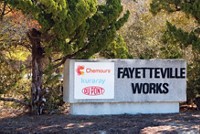Advertisement
Grab your lab coat. Let's get started
Welcome!
Welcome!
Create an account below to get 6 C&EN articles per month, receive newsletters and more - all free.
It seems this is your first time logging in online. Please enter the following information to continue.
As an ACS member you automatically get access to this site. All we need is few more details to create your reading experience.
Not you? Sign in with a different account.
Not you? Sign in with a different account.
ERROR 1
ERROR 1
ERROR 2
ERROR 2
ERROR 2
ERROR 2
ERROR 2
Password and Confirm password must match.
If you have an ACS member number, please enter it here so we can link this account to your membership. (optional)
ERROR 2
ACS values your privacy. By submitting your information, you are gaining access to C&EN and subscribing to our weekly newsletter. We use the information you provide to make your reading experience better, and we will never sell your data to third party members.
Persistent Pollutants
Asahi Kasei, Michigan settle suit over PFAS contamination
The settlement could be the first of many, Michigan’s attorney general says
by Jeff Johnson, special to C&EN
February 3, 2023
| A version of this story appeared in
Volume 101, Issue 5

Asahi Kasei Plastics North America and the State of Michigan have settled a lawsuit requiring the company to investigate and remediate per- and polyfluoroalkyl substances (PFAS) contamination at its former manufacturing site in Brighton.
The resulting consent decree calls for Asahi to investigate PFAS in soil, groundwater, and surface water at the site and to undertake suitable actions to address levels that exceed criteria set by the state. The settlement could be the first of many, Michigan attorney general Dana Nessel said at a press briefing Jan. 30.
Initially, 17 defendants were part of a 2020 lawsuit the state filed against PFAS manufacturers. Asahi’s portion was separated from the larger suit, and six PFAS cases are currently pending in either state or federal court. The Asahi case is the first to be resolved.
“I started the PFAS litigation project in 2020 to bring relief to communities impacted by PFAS,” Nessel said at the briefing. “They made the mess; they clean it up.” She estimated that the cost of the Asahi settlement, remediation, and cleanup will reach into the “millions of dollars.”
Asahi’s investigation and proposed work plans must be approved by Michigan’s Department of Environment, Great Lakes, and Energy (EGLE) under the consent decree. In addition, the agreement provides that work plans of significant public interest can be made available for public comment before their approval.
In a statement to C&EN, Asahi spokesperson Samantha Cronin endorses the agreement and says the company will continue its productive relationship with state and local authorities to fix any problems in the allotted time.
At the site, Asahi made reinforced plastic compounds that, according to the state, resulted in the release of PFAS. Difficult to break down, PFAS have been linked to several health concerns, including immune response suppression, cardiovascular harm, and interference with the development of fetuses and children.



Join the conversation
Contact the reporter
Submit a Letter to the Editor for publication
Engage with us on Twitter